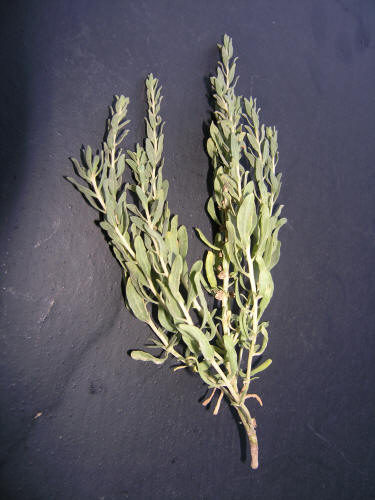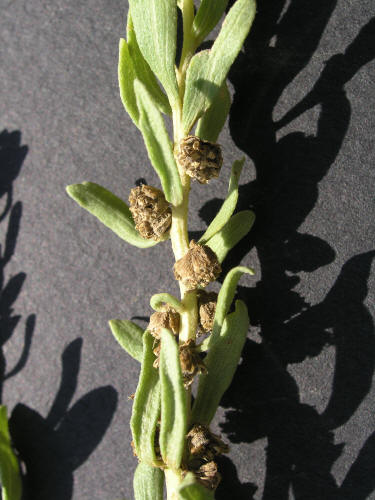Povertyweed
Povertyweed, Poverty Sumpweed
Iva axillaris Pursh.
Asteraceae (Aster Family)
▲ povertyweed in flower along gravel road in South Dakota
▲ mature flowering povertyweed in Laramie, Wyoming
▲ colony of povertyweed before flowering in Limon, Colorado
▲ ▼ stem with closer view of axillary flowers and leaves

▲ ▼ mature stem with dried axillary flowers

▲ top side of leaf
▲ bottom side of leaf
Iva axillaris Pursh., Povertyweed, Sumpweed: (Bayer Code: IVAAX; US Code IVXA)
- U.S. native, creeping root-producing creeping perennial that grows 8-24 inches tall, with round, gray-green to yellow-green, tan or pinkish, hairy, rough-textured stems that may be unbranched, but more often, branched from near the base; tends to form colonies from shoots from the deep creeping roots
- Leaves opposite on lower stems, alternate as flowering commences, gray-green, rough-textured, with stiff hairs and many gland dots, oval-shaped, with smooth margins and round-pointed tips; leaves have short or no petioles; leaves tend to curve upward from the stem toward their tips, and margins may be twisted or curled slightly
- Head inflorescences are in small clusters in the axils of the upper stem leaves, and they hang downward, like little bells
- Flowering is from mid-spring to mid-autumn
- Found in dry to moist soils in prairies, pastures, rangeland, right-of-ways, non-crop areas, riparian areas; tolerant of saline and alkaline soils
- Can accumulate selenium in high-selenium soils, but usually avoided by grazing animals
(Updated November 28, 2022)